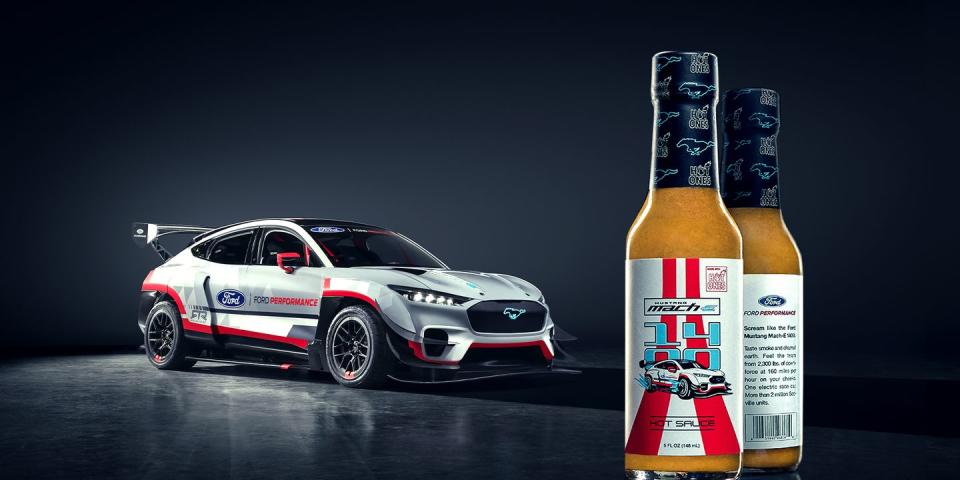Crossovers of the Cars and Culinary Variety

“Hearst Magazines and Verizon Media may earn commission or revenue on some items through the links below.”
When Ford Performance wanted a more relatable way to convey the scorching performance of the Mach-E 1400, the automaker disappeared into the pantry and came back with a bottle of hot sauce. Ford wouldn't sell its brew, though. The closest the general public could get to the "notes of smoke, charred earth, [and] plenty of insanely hot peppers" was watching an episode of the YouTube show "Hot Ones" with host Sean Evans and Ford Performance driver Vaughn Gittin, Jr.
That sauce got us thinking about other instances of the automotive world parking up in the food aisle. Toyota, Mitsubishi, and Hyundai have industrial food and agriculture divisions. Volkswagen started making its beechwood-smoked currywurst in 1973 and sells the mildly spicy pork sausage in factory canteens, European grocery stores, and soccer stadiums.
A few more more examples of cars crossing over into the culinary world, all available somewhere in the world.
Carroll Shelby's Chili Kit
A couple of years after debuting the first Shelby Mustang GT350 and a few months after winning the 24 Hours of Le Mans a second time with the Ford GT40, Carroll Shelby had more spare time to fill. In 1967, on a 200,000-acre patch of ground in Terlingua, west Texas that he used as an open-air man cave, Shelby helped host the first Terlingua Chili Cook-Off.
Shelby not only loved a good bowl of chili, he whipped up his own four-ingredient chili-making kit and began giving it away in brown paper bags. By 1973, Shelby's chili kit was on store shelves.
The instructions on the box say it takes 35 minutes to make, leading an online reviewer called the Mad Meat Genius to say of it, "the fastest chili I have ever made." Considering the kit's inventor, that's fitting.

Olivio Premium Products
Lee Iacocca has at least two connections to food. The first is through his uncle, Theodore Iacocca, who founded the Yocco's chain of hot dog joints in the Lehigh Valley, Pennsylvania in 1922. The name comes courtesy of the area's Pennsylvania Dutch who couldn’t pronounce Iacocca, so Theodore changed the spelling to what the locals could pronounce.
Lee Iacocca's more personal venture is Olivio, which makes olive-oil based spreads and a spray. The ex-Ford and Chrysler honcho owned a villa in Italy with 408 olive trees and 25 acres of vineyards, annually gathering local help to turn out olive oil and wine. Eventually, Iacocca and his son-in-law, Ned Hentz, asked a question you rarely hear nowadays: "Could we possibly make olive oil into a buttery spread?"
They answered the question in 1993 by founding Olivio. Hentz runs the company as its president and CEO, with a portion of revenues continuing to support the Iacocca Foundation.
Tonino Lamborghini Drinks
Feruccio Lamborghini had one son, Tonino. While Audi shepherds Lamborghini's automotive brand, the heir has found his niche licensing the Lamborghini name to other products, meaning everything from a Tonino Lamborghini-branded $19 Eau de Toilette to a $150 lighter.
Since Audi's in the accessories game, too, Audi's efforts are identified by a black badge with a gold or a silver bull, Tonino's products get a red badge with a silver bull.
But only Tonino has an Officina Gastronomica selling beverages: two blends of espresso, eight flavors of hot chocolate, an energy drink, vodka, and Sangue di Miura wine.
The energy drink could be considered the most on-brand. People who review such liquid hyperactivity (who knew?) say the Lamborghini drink tastes just like Red Bull—Tonino's site even refers to his can's "red bull logo." An 8.4-ounce can from each brand contains the same amount of caffeine at 80 milligrams, but the Red Bull has ten times more taurine, a difference that can only be regarded as admirable restraint from Lamborghini.
Peugeot Kitchenware
Jean-Pierre Peugeot II and Jean-Frédéric Peugeot turned their father's old grist mill into a steel foundry in 1810. So began the company that would deliver the 308, win five World Rally Championships, eight Le Mans trophies, and compel Porsche to rename the Porsche 901 to the 911.
They started with small tools and home goods like saw blades, umbrellas, and bicycles. In 1848, they debuted their first coffee grinder. Engineers adapted that grinder for use on peppercorns and rolled out the Z model home pepper mill in 1874, first fashioned out of white china. Peugeot didn't make its first car until 1889.

 Yahoo Autos
Yahoo Autos 